写出下例动词的现在分词形式2012.7.24
- 格式:doc
- 大小:99.50 KB
- 文档页数:8
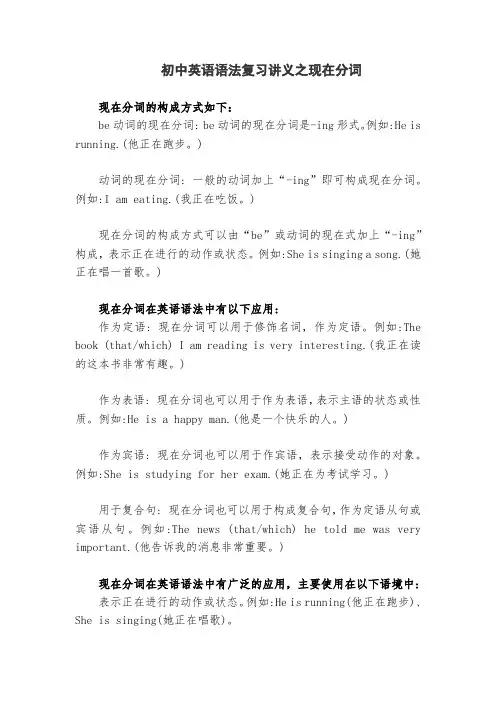
初中英语语法复习讲义之现在分词现在分词的构成方式如下:be动词的现在分词: be动词的现在分词是-ing形式。
例如:He is running.(他正在跑步。
)动词的现在分词: 一般的动词加上“-ing”即可构成现在分词。
例如:I am eating.(我正在吃饭。
)现在分词的构成方式可以由“be”或动词的现在式加上“-ing”构成,表示正在进行的动作或状态。
例如:She is singing a song.(她正在唱一首歌。
)现在分词在英语语法中有以下应用:作为定语: 现在分词可以用于修饰名词,作为定语。
例如:The book (that/which) I am reading is very interesting.(我正在读的这本书非常有趣。
)作为表语: 现在分词也可以用于作为表语,表示主语的状态或性质。
例如:He is a happy man.(他是一个快乐的人。
)作为宾语: 现在分词也可以用于作宾语,表示接受动作的对象。
例如:She is studying for her exam.(她正在为考试学习。
)用于复合句: 现在分词也可以用于构成复合句,作为定语从句或宾语从句。
例如:The news (that/which) he told me was very important.(他告诉我的消息非常重要。
)现在分词在英语语法中有广泛的应用,主要使用在以下语境中:表示正在进行的动作或状态。
例如:He is running(他正在跑步)、She is singing(她正在唱歌)。
作为定语修饰名词。
例如:The book (that/which) I am reading is very interesting(我正在读的这本书非常有趣)。
作为表语表示主语的状态或性质。
例如:He is a happy man(他是一个快乐的人)。
作为宾语表示接受动作的对象。
例如:She is studying for her exam(她正在为考试学习)。

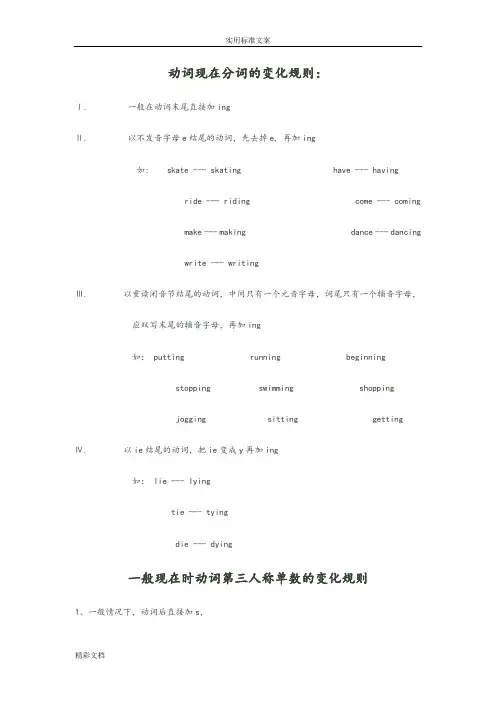
动词现在分词的变化规则:Ⅰ. 一般在动词末尾直接加ingⅡ. 以不发音字母e结尾的动词,先去掉e, 再加ing如: skate --- skating have --- havingride --- riding come --- comingmake --- making dance --- dancingwrite --- writingⅢ. 以重读闭音节结尾的动词,中间只有一个元音字母,词尾只有一个辅音字母,应双写末尾的辅音字母,再加ing如: putting running beginningstopping swimming shoppingjogging sitting getting Ⅳ. 以ie结尾的动词,把ie变成y再加ing如: lie --- lyingtie --- tyingdie --- dying一般现在时动词第三人称单数的变化规则1、一般情况下,动词后直接加s,如:works,gets,reads等。
2、以s,x,ch,sh或o结尾的动词,在后面加es,如:goes,teaches,washes等。
3、以辅音字母加y结尾的动词,把y变为i,再加es,如:study--studies,try--tries,carry--carries等。
4、动词have遇在主语是第三人称单数时,have改为has,如:He has an interesting book .5、动词be遇有主语是第一人称单数时,be改为am,遇有主语是第二人称时,be改为are,遇有主语是第三人称单数时,be改为is。
一、动词第三人称单数的变化规则及发音规律动词原形变第三人称单数的规则与发音规律同名词单数变复数大致相同,请认真观察。
1、大多数动词在词尾加“S”在清辅音后发音为[s],在浊辅音及元音后发音为 [z]。
在t 后读[ts],在d后读[dz],如:①stop-stops [s] ; make-makes [s]②read-reads [z] ; play-plays [z]2、以辅音字母加“y”结尾的,要先将“y”变为“i”,然后在加“es”读[iz] 如:fly-flies [z]; carry-carries [z]study-studies [z]; worry-worries3、以“s, x, ch, sh”结尾的,在词尾加“es”,发音为[iz] 如:teach-teaches [iz]; watch-watches [iz]4、以“o”结尾的动词,加“es”,读[z] 如:go-goes [z] do-does [z]下面几个动词变为单数时,原词的元音部分的发音发生了较大的变化,请注意记忆。
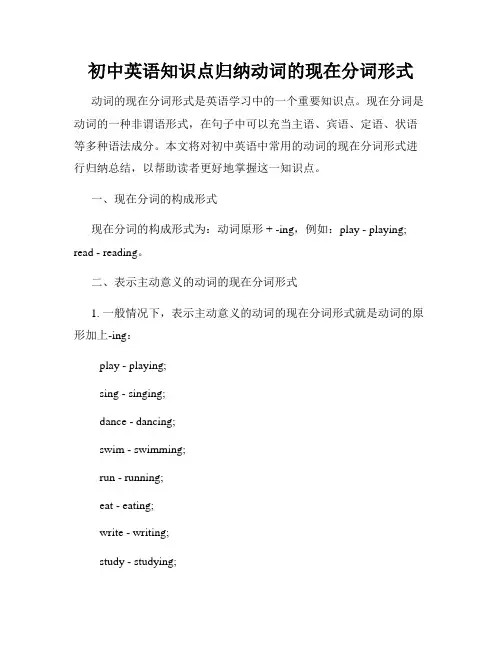
初中英语知识点归纳动词的现在分词形式动词的现在分词形式是英语学习中的一个重要知识点。
现在分词是动词的一种非谓语形式,在句子中可以充当主语、宾语、定语、状语等多种语法成分。
本文将对初中英语中常用的动词的现在分词形式进行归纳总结,以帮助读者更好地掌握这一知识点。
一、现在分词的构成形式现在分词的构成形式为:动词原形 + -ing,例如:play - playing; read - reading。
二、表示主动意义的动词的现在分词形式1. 一般情况下,表示主动意义的动词的现在分词形式就是动词的原形加上-ing:play - playing;sing - singing;dance - dancing;swim - swimming;run - running;eat - eating;write - writing;study - studying;etc.2. 以不发音的字母e结尾的动词,去掉e后再加-ing:make - making;take - taking;come - coming;give - giving;live - living;etc.3. 以重读闭音节结尾,并且末尾只有一个辅音字母的动词,双写末尾的辅音字母,再加-ing:sit - sitting;put - putting;run - running;etc.4. 以辅音字母+y结尾的动词,将y变为i,再加-ing:study - studying;try - trying;fly - flying;etc.5. 以-ie结尾的动词,改-ie为-y,再加-ing:die - dying;lie - lying;tie - tying;etc.三、表示被动意义的动词的现在分词形式表示被动意义的动词的现在分词形式由"be"(am, is, are, was, were)+ 动词的过去分词构成:1. play - being played;2. sing - being sung;3. dance - being danced;4. swim - being swum;5. run - being run;6. eat - being eaten;7. write - being written;8. study - being studied;9. etc.四、表示完成意义的动词的现在分词形式表示完成意义的动词的现在分词形式由"have/has/had" + 动词的过去分词构成:1. play - having played;2. sing - having sung;3. dance - having danced;4. swim - having swum;5. run - having run;6. eat - having eaten;7. write - having written;8. study - having studied;9. etc.五、常见动词的现在分词形式总结以下是一些常见动词的现在分词形式的归纳总结:1. doing(do的现在分词)2. going(go的现在分词)3. saying(say的现在分词)4. getting(get的现在分词)5. making(make的现在分词)6. taking(take的现在分词)7. sleeping(sleep的现在分词)8. reading(read的现在分词)9. watching(watch的现在分词)10. writing(write的现在分词)11. running(run的现在分词)12. swimming(swim的现在分词)13. eating(eat的现在分词)14. studying(study的现在分词)15. etc.通过对常见动词的现在分词形式的归纳总结,我们可以更好地掌握动词的现在分词形式的构成规则,提升我们在英语学习中的应用能力和写作能力。
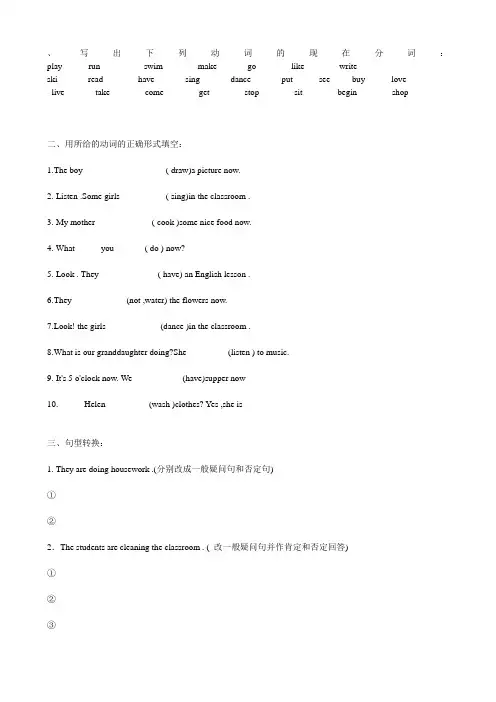
、写出下列动词的现在分词:play______run__________swim________make_______go________like________write________ski_______read________have_______sing_______dance_______put______see_____buy______love_________ _live_______take________come________get________stop________sit________begin________shop_________ _二、用所给的动词的正确形式填空:1.The boy __________________ ( draw)a picture now.2. Listen .Some girls __________( sing)in the classroom .3. My mother ____________ ( cook )some nice food now.4. What _____ you ______ ( do ) now?5. Look . They _____________( have) an English lesson .6.They ____________(not ,water) the flowers now.7.Look! the girls ____________(dance )in the classroom .8.What is our granddaughter doing?She _________(listen ) to music.9. It's 5 o'clock now. We ___________(have)supper now10.______Helen__________(wash )clothes? Yes ,she is三、句型转换:1. They are doing housework .(分别改成一般疑问句和否定句)①_______________________________________________②_______________________________________________2.The students are cleaning the classroom . ( 改一般疑问句并作肯定和否定回答)①_______________________________________________②_ ___________________________________③_____________________________3.I'm playing the football in the playground .(改为否定句)________________________________________________4.Tom is reading books in his study . (改为一般疑问句)________________________________________________5. My mother is cooking some nice food now. ( 改一般疑问句并作肯定和否定回答)①_______________________________________________②_ ___________________________________③_____________________________6.They are not watering the flowers now. (改为肯定句)现在进行时态提高题一.填空题1.Mr Zheng _______________ (read) a book now.2. The rabbits _________________ (jump) now.3.. Look ! Tom and Jo(转载自出国留学网,请保留此信息。
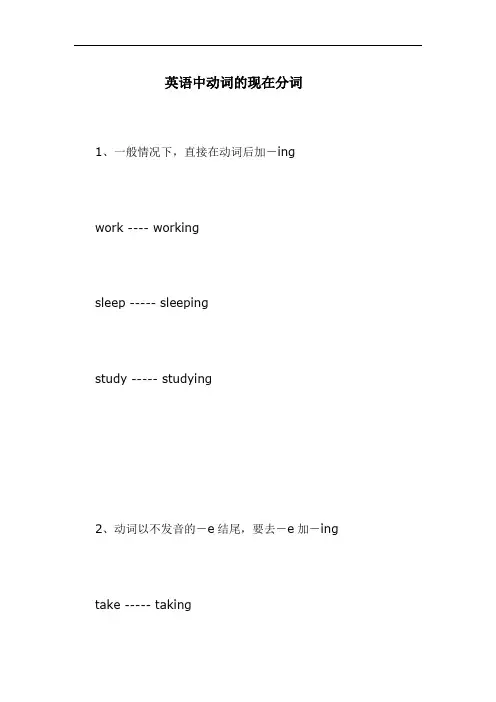
英语中动词的现在分词
1、一般情况下,直接在动词后加-ing
work ---- working
sleep ----- sleeping
study ----- studying
2、动词以不发音的-e结尾,要去-e加-ing take ----- taking
make ----- making
dance ----- dancing
3、重读闭音节的动词,要双写词尾字母,再加-ing cut ----- cutting
put ----- putting
begin ------ beginning
4、以-ie结尾的动词,把变成y再加-ing
lie ----- lying
tie ----- tying
die ----- dying
口诀:现在进行ing,以e 结尾要去e,除去几个特殊词,系住tie-tying死去die-dying要躺下lie-lying,直接ie变成y,
需要双写加ing的词,请背下来!
swim-swimming run-running put-putting sit-sitting begin-beginning plan-planning
cut-cutting get-getting shop-shopping chat-chatting stop-stopping regret-regretting
dig-digging prefer-preferring trek-trekking
规则:1.必须是重读音节(一个音节的词,本身就是重读音节)
2.必须是闭音节(以一个或几个辅音字母(r 除外)结尾而中间只有一个元音字母的音节,称为闭音节)。
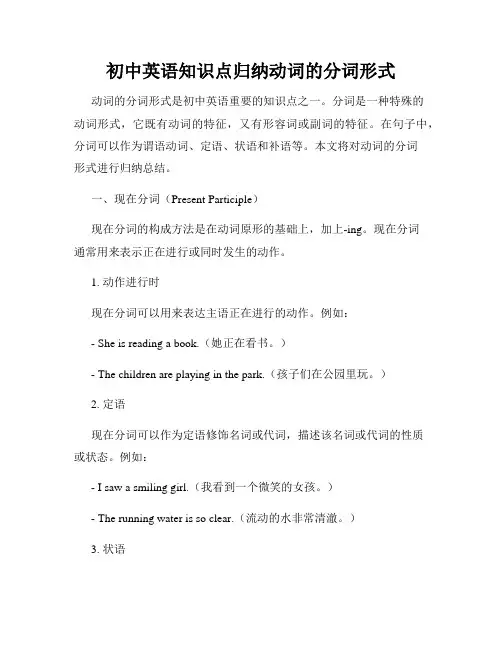
初中英语知识点归纳动词的分词形式动词的分词形式是初中英语重要的知识点之一。
分词是一种特殊的动词形式,它既有动词的特征,又有形容词或副词的特征。
在句子中,分词可以作为谓语动词、定语、状语和补语等。
本文将对动词的分词形式进行归纳总结。
一、现在分词(Present Participle)现在分词的构成方法是在动词原形的基础上,加上-ing。
现在分词通常用来表示正在进行或同时发生的动作。
1. 动作进行时现在分词可以用来表达主语正在进行的动作。
例如:- She is reading a book.(她正在看书。
)- The children are playing in the park.(孩子们在公园里玩。
)2. 定语现在分词可以作为定语修饰名词或代词,描述该名词或代词的性质或状态。
例如:- I saw a smiling girl.(我看到一个微笑的女孩。
)- The running water is so clear.(流动的水非常清澈。
)3. 状语现在分词可以作为状语修饰整个句子或句子中的动词,表示附加的信息。
例如:- He left the room, slamming the door behind him.(他离开房间的时候,砰地关上了门。
)- While studying, don't forget to take breaks.(学习的时候,别忘了休息。
)二、过去分词(Past Participle)过去分词的构成方法有多种,常见的有以下几种形式:动词加-ed、动词的第三形式(不规则动词)、部分动词短语等。
过去分词通常用来表示完成的动作或已经发生的动作。
1. 被动语态过去分词常用于构成被动语态,表示动作的接受者或受害者。
例如:- The car was repaired by a professional mechanic.(汽车被一位专业的机修师修好了。
)- The cake was eaten by the kids.(蛋糕被孩子们吃掉了。

动词的现在分词标准化管理部编码-[99968T-6889628-J68568-1689N]动词的现在分词(-ing)规则现在分词的构成方法(1)一般情况下,在动词后加-ing构成:work--working,sleep--sleeping,wait--waiting等。
(2)在不发音的-e结尾动词去掉e后再加-ing:smile--smiling,move-movingtake-takingmake--making等。
(3)以重读闭音节或r音节结尾且末尾只有一个辅音字母动词,要双写末尾的辅音字母再加-ing:sit--sitting,plan--planning,refer--referring,occur—occurring,begin—beginning,beg—begging,cut—cutting,get—getting,hit—hitting,let—letting,swim-swimming,permit-permittingstop-stopping,drop-dropping,dig-digging,win-winning,run-running,put-putting,admit-admitting,shop--shopping,fit--fitting,forget--forgetting,spit--spitting(4)以字母ie结尾的动词,通常将ie改为y,再加ing:die--dying,lie--lying,tie--tying等。
【注】(1)以字母l结尾动词,若末尾一个音节为重读音节,则必须双写l 再加ing,如control--controlling,但若末尾一个音节为非重读音节,则可双写l(英国英语)或不双写l(美国英语),如:travel—traveling/travelling。
(2)动词picnic(野餐)的现在分词为picnicking,不是picnicing。
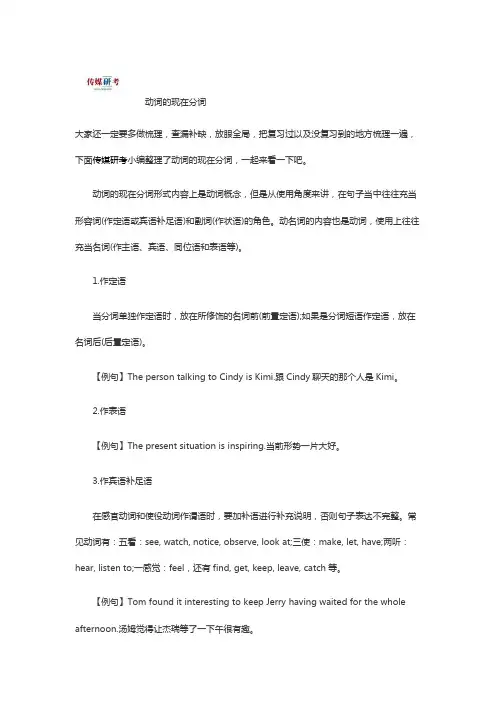
动词的现在分词大家还一定要多做梳理,查漏补缺,放眼全局,把复习过以及没复习到的地方梳理一遍,下面传媒研考小编整理了动词的现在分词,一起来看一下吧。
动词的现在分词形式内容上是动词概念,但是从使用角度来讲,在句子当中往往充当形容词(作定语或宾语补足语)和副词(作状语)的角色。
动名词的内容也是动词,使用上往往充当名词(作主语、宾语、同位语和表语等)。
1.作定语当分词单独作定语时,放在所修饰的名词前(前置定语);如果是分词短语作定语,放在名词后(后置定语)。
【例句】The person talking to Cindy is Kimi.跟Cindy聊天的那个人是Kimi。
2.作表语【例句】The present situation is inspiring.当前形势一片大好。
3.作宾语补足语在感官动词和使役动词作谓语时,要加补语进行补充说明,否则句子表达不完整。
常见动词有:五看:see, watch, notice, observe, look at;三使:make, let, have;两听:hear, listen to;一感觉:feel,还有find, get, keep, leave, catch等。
【例句】Tom found it interesting to keep Jerry having waited for the whole afternoon.汤姆觉得让杰瑞等了一下午很有趣。
4.作状语①作时间状语【例句】(While)Working in the university, he was an outstanding teacher.在大学工作时,他是一名出色的教师。
②作原因状语【例句】Being a communist, Leifeng was always helping others.雷锋是共产党员,经常帮助他人。
③作方式状语,表示伴随【例句】Tom stayed at home, cleaning, washing and taking care of the children.汤姆待在家里,又擦又洗还带孩子。
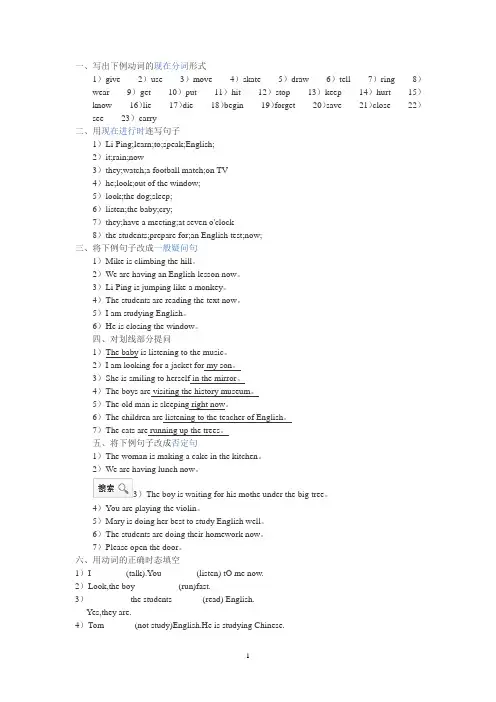
一、写出下例动词的现在分词形式1)give____2)use____3)move____4)skate____5)draw____6)tell____7)ring____8)wear____9)get____10)put____11)hit____12)stop____13)keep____14)hurt____15)know____16)lie____17)die____18)begin____19)forget____20)save____21)close____22)see____23)carry____二、用现在进行时连写句子1)Li Ping;learn;to;speak;English;2)it;rain;now3)they;watch;a football match;on TV4)he;look;out of the window;5)look;the dog;sleep;6)listen;the baby;cry;7)they;have a meeting;at seven o'clock8)the students;prepare for;an English test;now;三、将下例句子改成一般疑问句1)Mike is climbing the hill。
2)We are having an English lesson now。
3)Li Ping is jumping like a monkey。
4)The students are reading the text now。
5)I am studying English。
6)He is closing the window。
四、对划线部分提问1)The baby is listening to the music。
2)I am looking for a jacket for my son。
3)She is smiling to herself in the mirror。
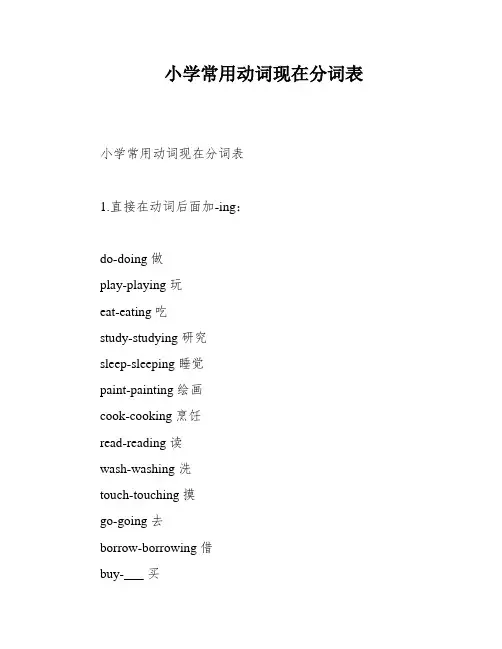
小学常用动词现在分词表小学常用动词现在分词表1.直接在动词后面加-ing:do-doing 做play-playing 玩eat-eating 吃study-studying 研究sleep-sleeping 睡觉paint-painting 绘画cook-cooking 烹饪read-reading 读wash-washing 洗touch-touching 摸go-going 去borrow-borrowing 借buy-___ 买watch-watching 观看call-calling 打电话listen-listening 听fish-fishing 钓鱼fly-flying 飞sing-singing 唱draw-drawing 画cry-crying 哭___-___ 笑walk-walking 散步look-looking 看open-opening 打开think-thinking 思考sleep-sleeping 睡觉study-studying 研究___ 说话say-saying 说2.以重读闭音节结尾,呈现“辅,元,辅”结构的动词,先双写末尾的辅音字母,再加-ing:ping 停止run-running 跑etting 忘记3.以不发音的e结尾的,去e加-ing:write-writing 写ing 来use-using 使用have-having 有___ 旅行(可双写也可不双写)___ 参考___-preferring 更喜欢Dance is a form of n that involves moving your body to music。
Dancing can be done alone or with a partner。
and it is a great way to exercise and have fun。
Whether you are a nal dancer or just enjoy dancing for fun。
动词的现在分词的变化规则Document serial number【NL89WT-NY98YT-NC8CB-NNUUT-NUT108】动词的现在分词的变化规则(现在进行时)1一般的动词,直接在动词后加ingwork--workingsleep--sleepingstudy--studying2以不发音字母e结尾的动词,要先去e加ingtake--takingmake--makingdance--dancing但是see--seeing3重读闭音节的动词,要双写最后一个字母,再加ingswim--swimming周六早晨游泳天气好get--getting(up)小明早晨未起早sit--sitting坐起忙把衣穿好put(on)--puttingbegin--beginning时间不早赶紧开始跑run--runningforget-–forgetting忘带午饭又把商店找shop--shoppingstop--stoppingcut--cutting停止剪发就逃跑4以ie结尾的动词,把ie变为y再加inglie-lying平躺/说谎tie-tying系,捆(鞋带,领带)die-dying死一般现在时1.概念:表示经常性或习惯性的动作或存在的状态。
2.一般现在时常常与下面这些时间状语连用:always(总是)usually(通常)often(经常)sometimes(有时)seldom(很少)never(从不)once/twiceaweek(一周一/二次)everyday/month/year每天/每月/年3.当主语不是第三人称人称单数时,主语后面的动词用动词原形,不需做任何变化。
如:I go toschoolbybuseveryday.I have apenandabook.We watch TVeveryday.You have alotofmoney.Theyoften do theirhomework.4.当主语是第三人称单数时,主语后面的动词需要做相应的变化.即在动词后面加s或es或把have改为has3.第三人称单数,动词的变化规则:(1)一般动词后面直接加s如:play-play s like-like sSheusuallysing s song.(2)动词以s,x,ch,sh,o结尾的加-es如:watch-watch es go-go eswash-wash es do-do esHego es toschoolbybus.(3)以辅音字母加y结尾的动词,把y改为i再加-es如:fly-fl i es study-stud i esLipingstud i es hardatschool.4.如果要把一个含有be动词的句子,变为一般疑问句,直接把does(主语是第三人称单数)一般疑问句:就把do或does提到主语之前。
动词的现在分词(-ing)规则现在分词的构成方法(1) 一般情况下,在动词后加-ing构成:work-- working, sleep--sleeping, wait -- waiting等。
(2) 在不发音的-e结尾动词去掉e后再加-ing:smile--smiling, move-moving take-taking make--making等。
(3) 以重读闭音节或r音节结尾且末尾只有一个辅音字母动词,要双写末尾的辅音字母再加-ing:sit--sitting, plan--planning, refer--referring,occur—occurring, begin—beginning, beg—begging,cut—cutting, get—getting, hit—hitting, let—letting,swim-swimming, permit-permitting stop-stopping,drop-dropping, dig-digging, win-winning, run-running,put-putting, admit-admitting,shop--shopping,fit--fitting, forget--forgetting, spit--spitting(4)以字母ie结尾的动词,通常将ie改为y,再加ing:die--dying, lie--lying, tie--tying等。
【注】(1) 以字母l结尾动词,若末尾一个音节为重读音节,则必须双写l再加ing,如control --controlling,但若末尾一个音节为非重读音节,则可双写l(英国英语)或不双写l(美国英语),如: travel—traveling/travelling。
(2) 动词picnic(野餐)的现在分词为picnicking,不是picnicing。
提示:常见的现在分词如下:cut -- cutting 切 put-- putting 放 swim -- swimming 游泳begin -- beginning 开始 get -- getting 得到,获得forget -- forgetting 忘记 hit -- hitting 打,击,撞spit -- spitting 吐痰 run -- running 跑 sit -- sitting 坐babysit -- babysitting 临时照看婴儿 split -- splitting 分裂shut -- shutting 关闭 win --winning 赢 shop --shopping 购物stop -- stopping 停止 drop -- dropping 落下dip-- dipping 浸dig -- digging 挖 plan -- planning 计划 prefer -- preferring 更喜欢refer -- referring 查阅,参考 let -- letting 让 trip -- tripping 绊倒step -- stepping 踩,踏 rob -- robbing 抢劫 set -- setting 设置nod -- nodding 点头 fit -- fitting 合适 regret -- regretting 后悔rot--rotting 腐烂 spot--spotting 玷污 slip--slipping 滑倒wrap--wrapping包装记住单词词性符号:vt.及物动词 Vi. 不及物动词 N.名词 adv. 副词Adj.形容词 prep.介词 Pron.代词 Conj. 连词 Num.数词Welcome !!! 欢迎您的下载,资料仅供参考!。
高中英语知识点:动词的现在分词现在分词的概念:现在分词是由动词原形加词尾-ing构成。
现在分词有主动意义,同样也有时态和语态的变化。
动词现在分词变化规则:1、一般情况下在动词后加ing,如:study—studying,work—working2、以不发音的字母e结尾的动词,先去掉e再加ing,如:write—writing,move—moving3、以一个元音字母和一个辅音字母结尾的重读音节结尾的动词,要双写末尾一个辅音字母,再加ing,如:get—getting,begin—beginning4、以ie结尾的动词,一般将ie改为y,再加ing,如:lie—lying,die—dying,tie—tying注意:以l结尾的动词,尾音节重读时,双写l,如:control—controlled,尾音节不重读时,双不双写都可以,如:travel—traveling/travelling。
特例:picnic—picnicking。
动词现在分词用法拓展:1、现在分词的构成:现在分词是由动词原形加词尾-ing构成。
现在分词同样有时态和语态的变化,通常有下表几种形式(以do为例):一般式:主动形式doing被动形式beingdone完成式:主动形式havingdone被动形式having been done现在分词的否定形式是由not加现在分词构成。
如:Not knowing his address, I could do nothing but stay at home and wait. 不知道他的地址,我只好在家里等着。
His not coming made all of us angry. 他没来使我们大家都很生气。
2、现在分词的一般式和完成式:现在分词的一般式表示和谓语动词所表示的动作同时进行的动作;完成式表示在谓语动词所表示的动作之前发生的动作。
如:Being a student, he was interested in books. 作为一个学生,他对书本很感兴趣。
英语动词现在分词变化规则一般情况直接加-ing。
1 abandon abandoning2 absorb absorbing3 accord according4 account accounting5 act acting6 adapt adapting7 address addressing8 adjust adjusting9 affect affecting10 agree agreeing11 aim aiming12 alight alighting13 allow allowing14 alter altering15 amount amounting16 appeal appealing17 appear appearing18 apply applying19 appoint appointing20 arrest arresting21 ask asking22 attach attaching23 attain attaining24 attend attending25 attract attracting26 bar baring27 bark barking28 beam beaming29 bear bearing30 beat beating31 befall befalling32 behold beholding33 belong belonging34 bend bending35 benefit benefiting36 beseech beseeching37 bespread bespreading38 bethink bethinking39 bind binding40 bleed bleeding41 blend blending42 blow blowing43 boast boasting44 boost boosting45 border bordering46 break breaking47 breed breeding48 bring bringing49 broadcast broadcasting50 browbeat browbeating51 brush brushing52 budget budgeting53 build building54 burst bursting55 buy buying56 call calling57 cancel canceling59 cast casting60 catch catching61 cheat cheating62 check checking63 clean cleaning64 clear clearing65 cling clinging66 collect collecting67 combat combating68 complain complaining69 conduct conducting70 confess confessing71 confirm confirming72 conflict conflicting73 confront confronting74 connect connecting75 consent consenting76 consider considering77 consist consisting78 consult consulting79 contain containing80 contrast contrasting81 convert converting82 convey conveying83 cook cooking84 correspond corresponding85 cost costing86 count counting87 cover covering89 creep creeping90 cross crossing91 crow crowing92 cry crying93 curb curbing94 deal dealing95 delay delaying96 deliver delivering97 demand demanding98 deny denying99 depart departing100 depend depending101 descend descending 102 destroy destroying103 detest detesting104 develop developing105 differ differing106 direct directing107 disagree disagreeing 108 disappear disappearing 109 discuss discussing110 dismiss dismissing111 display displaying112 dispread dispreading 113 disregard disregarding 114 distinguish distinguishing 115 distract distracting116 distrust distrusting117 do doing118 doubt doubting119 draw drawing120 dress dressing121 drink drinking122 dry drying123 dwell dwelling124 earn earning125 eat eating126 employ employing127 encounter encountering 128 end ending129 establish establishing 130 exclaim exclaiming131 exhibit exhibiting132 exist existing133 expand expanding134 expect expecting135 experiment experimenting 136 exploit exploiting137 express expressing138 extend extending139 fail failing140 faint fainting141 fall falling142 feed feeding143 feel feeling144 fight fighting145 find finding146 finish finishing147 fix fixing149 fling flinging150 fly flying151 focus focusing152 follow following153 forbear forbearing154 fordo fordoing155 forecast forecasting 156 forego foregoing157 foreknow foreknowing 158 foresee foreseeing159 foretell foretelling160 form forming161 forswear forswearing 162 foster fostering163 free freeing164 furnish furnishing165 gain gaining166 gainsay gainsaying 167 gather gathering168 go going169 grind grinding170 grow growing171 guarantee guaranteeing 172 guard guarding173 guess guessing174 hamper hampering 175 hang hanging176 happen happening 177 head heading179 help helping180 hold holding181 hunger hungering182 hurry hurrying183 hurt hurting184 identify identifying185 implement implementing 186 impress impressing187 inform informing188 inlay inlaying189 insist insisting190 join joining191 jump jumping192 keep keeping193 key keying194 kneel kneeling195 knock knocking196 know knowing197 land landing198 laugh laughing199 lay laying200 lead leading201 lean leaning202 leap leaping203 learn learning204 lend lending205 lift lifting206 light lighting207 limit limiting208 link linking209 listen listening210 load loading211 long longing212 look looking213 maintain maintaining214 major majoring215 match matching216 matter mattering217 mean meaning218 meet meeting219 melt melting220 merit meriting221 milk milking222 minor minoring223 miscast miscasting224 misdeal misdealing225 mislay mislaying226 mislead misleading227 misspell misspelling228 misspend misspending229 misunderstand misunderstanding 230 move moving231 need needing232 obey obeying233 object objecting234 obtain obtaining235 occur occuring236 offer offering237 open opening238 order ordering239 outbreed outbreeding 240 outdo outdoing241 outeat outeating242 outfight outfighting 243 outgo outgoing244 outgrow outgrowing 245 outlay outlaying246 outride outriding247 outsell outselling248 outshoot outshooting 249 outspend outspending 250 outspread outspreading 251 outthrow outthrowing 252 outthrust outthrusting 253 outwear outwearing 254 overbear overbearing 255 overbid overbidding 256 overblow overblowing 257 overbuild overbuilding 258 overbuy overbuying 259 overcast overcasting 260 overdo overdoing261 overdraw overdrawing 262 overeat overeating 263 overfeed overfeeding 264 overfly overflying265 overgrow overgrowing 266 overhang overhanging 267 overhear overhearing268 overlay overlaying269 overlook overlooking 270 overpay overpaying271 oversee overseeing272 oversell overselling273 overshoot overshooting 274 oversleep oversleeping 275 overspend overspending 276 overspread overspreading 277 overthrow overthrowing 278 overwind overwinding 279 own owning280 part parting281 pass passing282 pay paying283 peer peering284 perform performing285 persist persisting286 pick picking287 play playing288 ply plying289 possess possessing290 pray praying291 precast precasting292 predict predicting293 present presenting294 proceed proceeding295 prohibit prohibiting296 prospect prospecting 297 protect protecting298 pull pulling299 quit quiting300 rain raining301 reach reaching302 read reading303 reason reasoning304 rebind rebinding305 rebuild rebuilding306 recall recalling307 recast recasting308 reckon reckoning309 recollect recollecting 310 recover recovering311 redo redoing312 reflect reflecting313 reform reforming314 regard regarding315 reject rejecting316 relay relaying317 rely relying318 remain remaining319 remark remarking320 remember remembering 321 remind reminding322 rend rending323 render rendering324 repair repairing325 repay repaying326 repeat repeating327 reply replying328 report reporting 329 resist resisting330 respect respecting 331 respond responding 332 respray respraying 333 rest resting334 restrain restraining 335 result resulting 336 retain retaining 337 retell retelling338 retreat retreating 339 return returning 340 review reviewing 341 ring ringing342 rush rushing343 satisfy satisfying 344 say saying345 scold scolding346 search searching 347 see seeing348 seek seeking349 seem seeming350 sell selling351 send sending352 shelter sheltering 353 shield shielding 354 shift shifting355 shoot shooting 356 shout shouting 357 show showing358 shrink shrinking 359 sing singing360 sink sinking361 slay slaying362 sleep sleeping 363 sling slinging 364 slink slinking 365 slit sliting366 slow slowing 367 smell smelling 368 sound sounding 369 speak speaking 370 speed speeding 371 spend spending 372 split spliting373 spoil spoiling 374 spread spreading 375 spring springing 376 stand standing 377 start starting 378 stay staying379 steal stealing 380 stick sticking 381 sting stinging 382 stink stinking 383 stoop stooping 384 stretch stretching 385 string stringing 386 study studying 387 subject subjecting388 succeed succeeding 389 suffer suffering390 supply supplying391 support supporting 392 suppress suppressing 393 surrender surrendering 394 suspect suspecting 395 suspend suspending 396 sustain sustaining397 swear swearing398 sweep sweeping399 swing swinging400 talk talking401 teach teaching402 tear tearing403 tell telling404 tender tendering405 test testing406 think thinking407 thirst thirsting408 threaten threatening 409 throw throwing410 thrust thrusting411 transfer transfering 412 transform transforming 413 tread treading414 treat treating415 trust trusting416 try trying417 turn turning418 unbend unbending419 unbind unbinding420 unbuild unbuilding421 underbuy underbuying 422 underdo underdoing423 underfeed underfeeding 424 undergo undergoing425 underlay underlaying426 underpay underpaying 427 undersell underselling 428 undershoot undershooting 429 understand understanding 430 undertake undertaking 431 undo undoing432 undraw undrawing433 unhang unhanging434 unlay unlaying435 unsay unsaying436 unsling unslinging437 unspeak unspeaking438 unstick unsticking439 unstring unstringing440 unswear unswearing441 unteach unteaching442 unthink unthinking443 untread untreading444 unwind unwinding445 upbuild upbuilding446 upcast upcasting447 uphold upholding448 uprise uprising449 upsweep upsweeping450 upswing upswinging451 visit visiting452 wait waiting453 walk walking454 want wanting455 warn warning456 wash washing457 watch watching458 waylay waylaying459 wear wearing460 weep weeping461 wind winding462 wish wishing463 withdraw withdrawing464 withhold withholding465 withstand withstanding466 work working467 wring wringing468 yield yielding以不发音的e、ue结尾的动词去e, 加-ing。
现在进行时一、写出下例动词的现在分词形式1)give____ 2)use____ 3)move____ 4)skate____ 5)draw____ 6)tell____ 7)ring____ 8)wear____ 9)get____ 10)put____ 11)hit____ 12)stop____ 13)keep____ 14)hurt____ 15)know____ 16)lie____ 17)die____ 18)begin____ 19)forget____ 20)save____ 21)close____ 22)see____ 23)carry____二、用现在进行时连写句子1)Li Ping; learn; to; speak; English; 2)it; rain; now3)they;watch;a football match;on TV 4)he;look;out of the window;5)look;the dog;sleep; 6)listen;the baby;cry;7)they;have a meeting;at seven o'clock8)the students;prepare for;an English test;now;三、将下例句子改成一般疑问句1)Mike is climbing the hill. 2)We are having an English lesson now. 3)Li Ping is jumping like a monkey.4)The students are reading the text now.5)I am studying English. 6)He is closing the window.四、对划线部分提问1)The baby is listening to the music. 2)I am looking for a jacket for my son. 3)She is smiling to herself in the mirror.(镜子)4)The boys are visiting the history museum.5)The old man is sleeping right now. 6)The cats are running up the trees. 7)The children are listening to the teacher of English.五、将下例句子改成否定句1)The woman is making a cake in the kitchen. 2)We are having lunch now. 3)The boy is waiting for his mother under the big tree.4)You are playing the violin. 6)The students are doing their homework now.六、用动词的正确时态填空1)I________(talk).You________(listen)to me now.2)Look, the boy__________(run)fast.3)----What are you doing? ----I_________(do) my homework.4)----_______the students_______(read) English. ----Yes ,they are.5)Tom_______(not study)English.He is studying Chinese.6)----Who_______(sing)a song? ---Li Ying is.7)The girl_______(not eat)bananas now.8)----Where ____ they____(stand)? ----They are standing over there.9)Look! The boy over there_______(ply) a model plane.10)----What is Meimei doing now? ----She______(watch)TV with her parents 11)He____(study) English very hard.12)We often____(buy)books and things like that in the shop.13)Polly____(not eat) a banana now.七、单项选择1)Jack is_____ with Jim. They are good____.A.running; friend;B.running; friends;C.running; friendsD.run; friend's 2)Look! Mary____doing____homework.A.is; one'sB. is; herC.are;hisD.are;her3)The Greens____ supper now.A.is havingB. are; havingC.is haveingD.are;having4)The children are____TV.A.watchB. seeingC. watchingD. reading5)Are the boys looking at the blackboard? Yes,they____.A. aren'tB. doC.don'tD.are一般过去时练习题一、单项选择:从下列各题后所给的四个选项中选择最佳答案填空。
( )1.My father ______ill yesterday.A. isn't B. aren't C. wasn't D. weren't( )2.____your parents at home last week﹖A. Is B. Was C. Are D. Were( )3.The twins____in Dalian last year. They____here now.A. are; were B. were; are C. was; are D. were; was( )4. _____your father at work the day____yesterday(前天)﹖A. Was; before B. Is; before C. Was; after D. Is; after ( )5.—Who was on duty last Friday﹖—______A. I am B. I was C. Yes, I was D. No, I wasn't二、请用正确动词形式填空。
1. I _________ (have) an exciting party last weekend.2. _______ she ______(practice) her guitar yesterday? No, she _________.3. What ________ Tom ________ (do) on Saturday evening?He ________(watch) TV and __________(read) an interesting book.4. They all _________(go) to the mountains yesterday morning.5. She _________(not visit) her aunt last weekend.She ________ (stay) at home and _________(do) some cleaning.三、翻译下列句子(20)1. 我过了一个忙碌但却刺激的周末。
I _________ _________ __________ __________ exciting weekend.2. Jenny喜欢看书。
昨晚她看了一本英语书。
Jenny likes _________ __________. She _________ an English book last night.3. Emma每天都看电视。
可是昨天他没有看。
Emma__________ TV every day. But he _________ ________ ________ yesterday.4. 上周六他们做什么了?他们做作业和购物了。
What ________ they _________ _________ Saturday?They _________ __________ homework and _________ __________.四、改写句子:(20)1、Lucy did her homework at home.(改否定句)Lucy ______ ______ her homework at home.2、He found some meat in the fridge(冰箱).(变一般疑问句)___________ he __________ ___________ meat in the fridge?3、There was some orange in the cup.(变一般疑问句)______ there ______ orange in the cup?4. Frank read an interesting book about history. (一般疑问句)_______ Frank _______ an interesting book about history?5. Why not go out for a walk? (同义句) _______ ________ ________ out for a walk?五、改错题(20)1.How is Jane yesterday? _____________________2.He go to school by bus last week. ____________________________3.He often goes home at 6:00 last month. ____________________________4.I can fly kites seven years ago. ______________________________5.Did you saw him just now. ____________________________________二、用some, any填空1.There’s ______ water in the cup. There isn’t ______ tea in the cup.2.Is there ______ bread here ? Yes , there is . There’s ______ on the table.3.Are there ______ cars in front of the building? No, there aren’t.4.There isn’t _____ chocolate on the table.5.Is there ______ soup(汤) on the table?三、用is, are , isn’t , aren’t填空1.There ______ a spoon (勺子) on the plate.2.There ______ some milk on the table . And there _______ any coffee here .3.There ______ some clouds in the sky. There ______ some boats on the river.4. There ______ any knives in the box.5.There ______ a newspaper in the living room.6.______ there any books in the room? Yes, there ______ .______ there any magazines on the television? No, there ______ .7.There ______ a policeman in the kitchen. 8.There ______ 60 minutes in an hour.9.There ______ a pencil, a ruler and two books on the desk.10.There ______ two glasses and a cup on the table.11.What ________ in this box ? There is a present in it .12. What _______ in that box ? There are two clothes in it .四、按要求做题1.There is a teacher in the office . 否定句 ________________________2.Is there a flower on the table ? 肯定回答____________ 肯定回答 __________________3.There are some pens in the box . 一般疑问句 __________________________4.There isn’t any water in the galss . 肯定句 ________________________5.There are two eggs and one cake here . 对划线部分提问 _______________________6.What’s on the box ? (a present) 回答问题 _______________________________7.How many books are there in your bag ? 回答问题 ___________________________8.There is a bird in the tree . 对划线部分提问 _________________________________9. There are lots of people in the par .对划线部分提问 ____________________________10. There is some water in the glass . 对划线部分提问 ____________________________一般疑问句并回答 ________________________________ _ 否定句_______________________________11.We are going to play ping-pong on Saturday.一般疑问句及回答___________________ 12.He's going to tell a story.否定句____________________________________ 13.She is going to work hard this term . 对划线部分提问 _______________________ 14.They're going to the park by bus.(对划线部分提问) _____________________ 15.The students have a trip on Sunday.用next Sunday改写 ______________________ 16.Linda has lunch at school on Tuesdays.用next Tuesday改写 ____________________将来时练习:一、用所给词的适当形式填空。